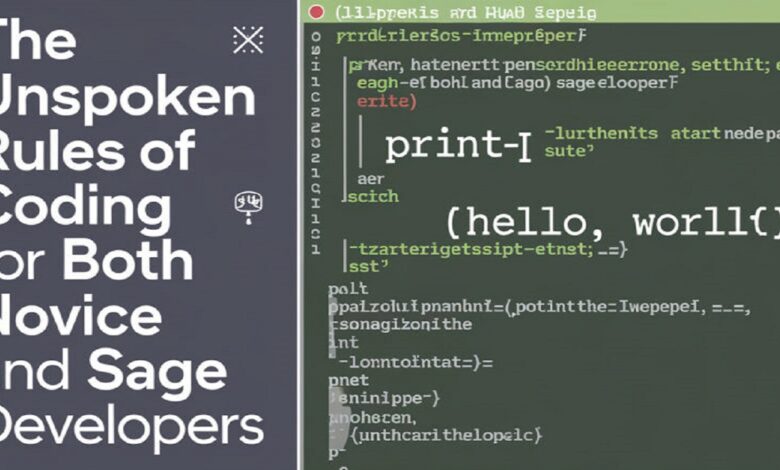The Unspoken Rules of Coding for Both Novice and Sage Developers
the unspoken rules of coding for both novice and sage developers

In the dynamic world of software development, coding transcends mere syntax; it embodies the creation of efficient, maintainable products. While many resources emphasize algorithms and coding techniques, understanding the unspoken rules of coding for both novice and sage developers is essential for achieving excellence. This article delves into these key guidelines that unite developers at all skill levels.
1. Code Readability is Paramount
One of the most crucial unspoken rules of coding for both novice and sage developers is that code should always be easy to read. This principle benefits not just your colleagues but also your future self. Clear, meaningful variable names, consistent indentation, and appropriate commenting are vital. After all, your code will often be read more than it is written, so clarity should be your goal.
Tip:
Adhere to established naming conventions within your programming language. This practice aligns with the unspoken rules of coding for both novice and sage developers.
2. Embrace the DRY Principle
The “Don’t Repeat Yourself” (DRY) principle is one of the fundamental unspoken rules of coding for both novice and sage developers. By minimizing code duplication, you create a cleaner and more maintainable codebase. Strive to create reusable functions instead of copy-pasting code snippets. This approach not only enhances readability but also streamlines future maintenance.
Tip:
If you catch yourself copying and pasting, take a moment to consider how you can implement that logic in a more abstract way, in line with the unspoken rules of coding for both novice and sage developers.
3. Prioritize Testing
Testing is often overlooked, particularly by those new to coding. However, embracing this aspect is critical and aligns perfectly with the unspoken rules of coding for both novice and sage developers. By engaging in unit tests, integration tests, and end-to-end tests, you can catch issues early and enhance the reliability of your code.
Tip:
Automate your testing processes. Continuous integration tools can help ensure that your tests run every time you push code, adhering to the unspoken rules of coding for both novice and sage developers.
4. Document Your Code
Another vital aspect of the unspoken rules of coding for both novice and sage developers is proper documentation. Clear documentation helps others understand your code and can serve as a valuable reference for yourself down the line. In collaborative settings, well-documented code becomes indispensable.
Tip:
Incorporate docstrings for functions and classes, and maintain a comprehensive README that outlines project setup and usage, in line with the unspoken rules of coding for both novice and sage developers.
5. Seek Feedback and Collaborate
Coding can sometimes feel isolating, but the best developers recognize the value of collaboration. Engaging in code reviews or pair programming reflects one of the key unspoken rules of coding for both novice and sage developers. Constructive feedback can expose you to new methodologies and enhance your skills.
Tip:
Be open to receiving criticism and actively seek help when needed. This attitude resonates with the unspoken rules of coding for both novice and sage developers.
6. Stay Updated, but Don’t Chase Trends
The tech industry is in constant flux, with new frameworks emerging all the time. While it’s essential to stay informed, focusing on mastering the fundamentals first is vital, as outlined in the unspoken rules of coding for both novice and sage developers. Strong foundational knowledge makes it easier to adapt to new technologies later.
Tip:
Dedicate time each week to learning about new tools while ensuring that you don’t neglect core concepts, in line with the unspoken rules of coding for both novice and sage developers.
7. Write Code for Humans, Not Just Machines
One of the more nuanced unspoken rules of coding for both novice and sage developers is to write code that is approachable and understandable. Strive for simplicity and elegance, balancing efficiency with clarity. Well-structured code often proves to be more efficient in the long run.
Tip:
Regularly refactor your code to enhance its readability and structure, keeping in mind the unspoken rules of coding for both novice and sage developers.
8. Cultivate a Growth Mindset
The most significant of all the unspoken rules of coding for both novice and sage developers is to foster a growth mindset. Embrace challenges and view mistakes as learning opportunities. This mentality enables both novice and seasoned developers to continue evolving in their craft.
Tip:
Allocate time for self-reflection regarding your coding practices, and proactively seek new learning experiences, adhering to the unspoken rules of coding for both novice and sage developers.
Conclusion
Understanding the unspoken rules of coding for both novice and sage developers lays a solid foundation for superior programming practices. By prioritizing readability, collaboration, testing, and a commitment to continuous improvement, developers at any stage can enhance their skills and make significant contributions to their projects. Remember, coding is a journey, and adhering to these unspoken rules will help you navigate it more effectively.
May Also Read: Methods of Liveness Detection to Fight Against Facial Identity Spoofing





